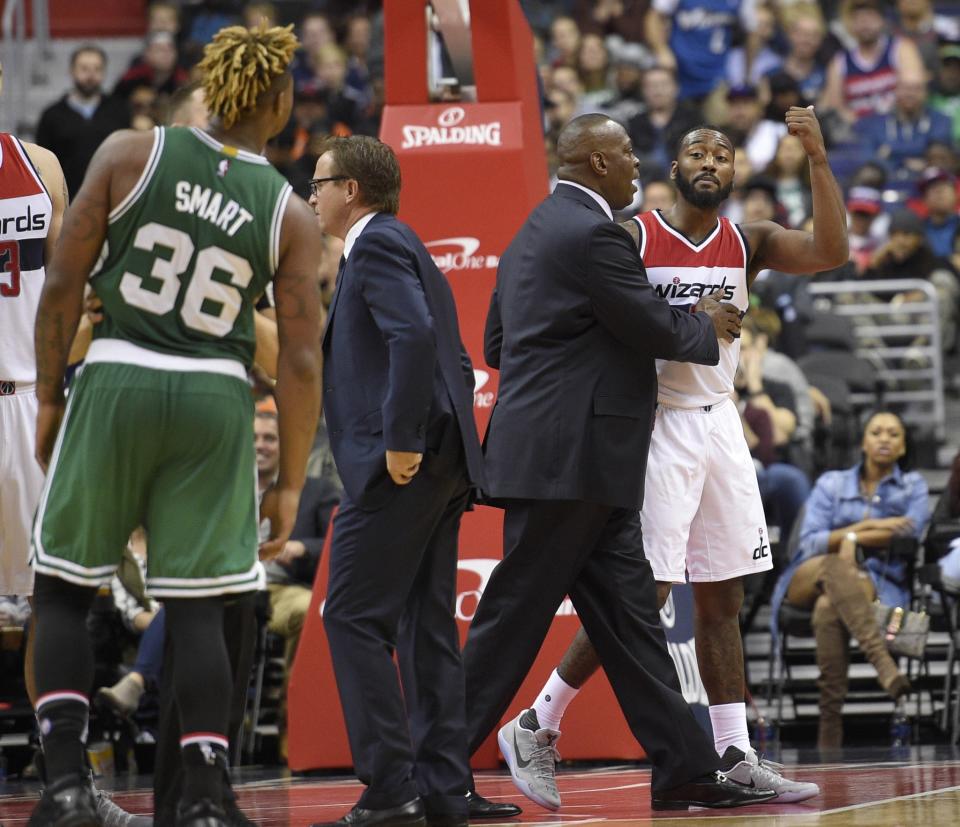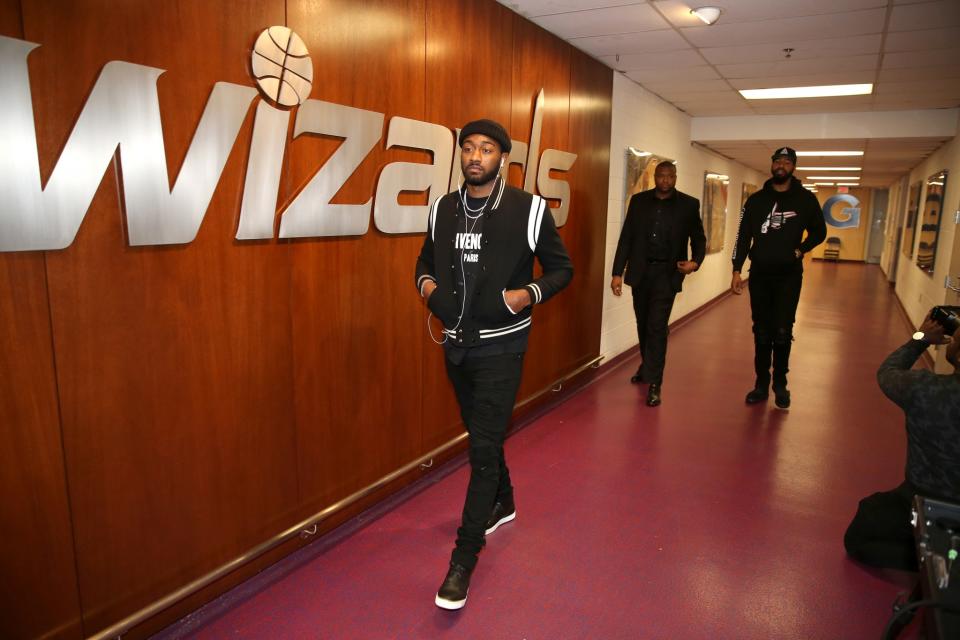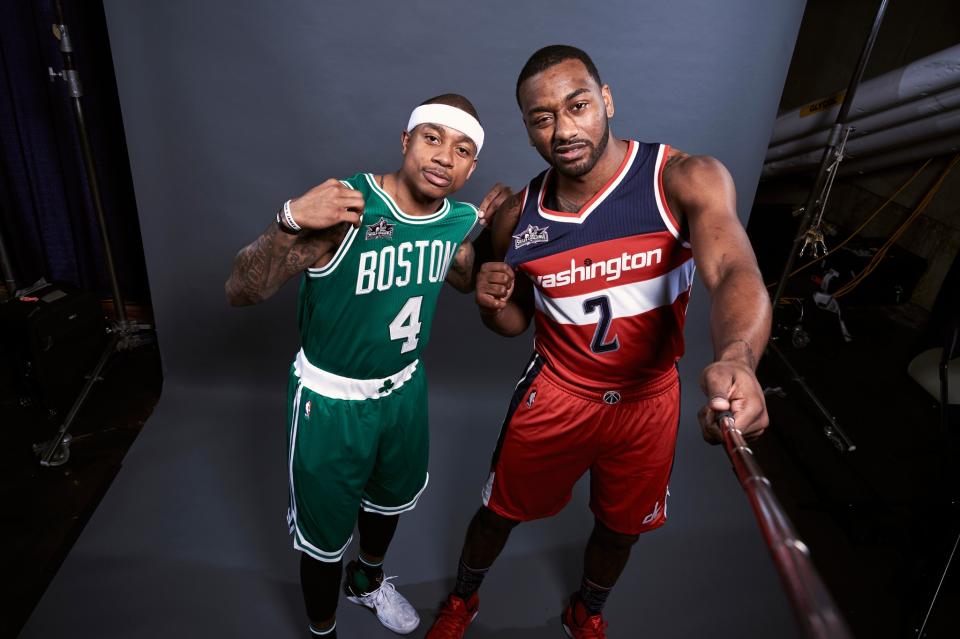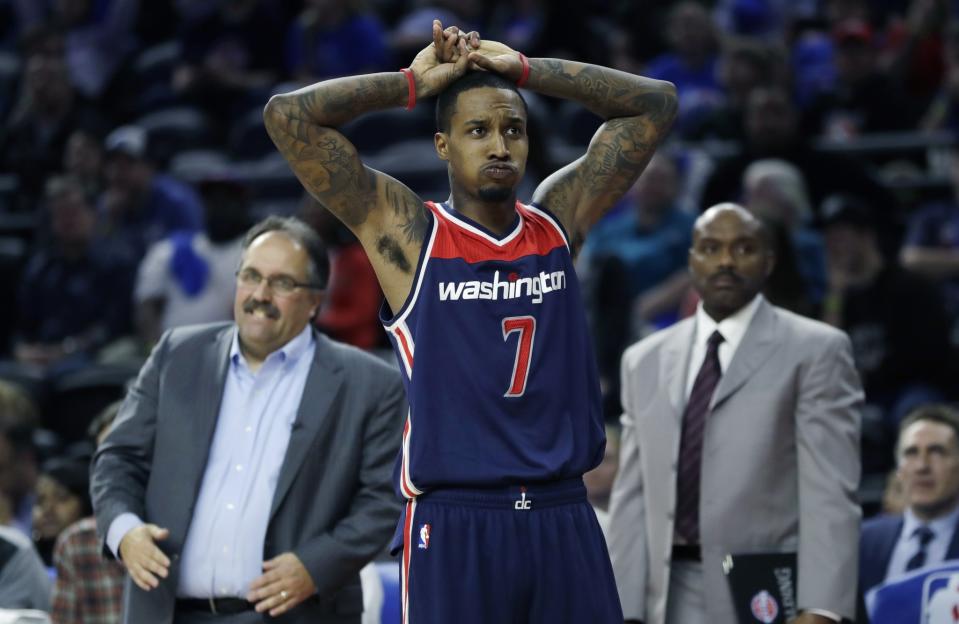BDL's 2016-17 NBA Playoff Previews: Boston Celtics vs. Washington Wizards

How They Got Here
• Celtics: By working through unfathomable tragedy and an early-series stumble to regain their footing and go on a run, thanks to some injury luck and a well-timed lineup change.
On the eve of the postseason, Celtics All-Star point guard Isaiah Thomas — Boston’s offensive engine and heartbeat — suffered the devastating loss of his younger sister, Chyna. After some deliberation, Thomas elected to play in Game 1 of the Celtics’ first-round matchup with the Chicago Bulls, just one day after learning of his 22-year-old sister’s death.
But despite a frankly remarkable performance by Thomas — a game-high 33 points with six assists and five rebounds — the top-seeded Celtics dropped Game 1 to the No. 8-ranked Bulls, who rode a dominating edge on the boards and a killer second half from All-Star shooting guard Jimmy Butler to a victory that wrested home-court advantage away from the reeling C’s. Playing with house money, the Bulls then authored a second straight upset. Center Robin Lopez dominated inside while Butler, Dwyane Wade and erstwhile Celtics star Rajon Rondo frustrated Boston at both ends, taking a 2-0 lead back to Chicago with a chance to put coach Brad Stevens’ team on the brink.
Then Rondo broke his right thumb, removing Fred Hoiberg’s best (and, as we’d learn, only) point guard from the Bulls’ rotation. And then Stevens found the tactical lever he could pull to force Chicago to play left-handed: sitting power forward Amir Johnson, who’d been ineffective at limiting the Bulls on the offensive glass, in favor of swingman Gerald Green, who had seen floor time in fewer than half of Boston’s games after the All-Star break.
Playing four perimeter players (Jae Crowder at power forward, Green and Avery Bradley on the wing, and Thomas at the point) forced Lopez to guard Al Horford, and to step away from the paint when Horford set a ball screen for Thomas in the high pick-and-roll. Suddenly, Boston’s offense was unlocked, and Lopez’s minutes were slashed, as Hoiberg’s search for options to check the small-ball Celtics forced Chicago away from its single biggest advantage.
He never found any, as the Celtics won four straight games. With Horford distributing the ball and shooters drilling 3s, they led wire-to-wire in a Game 6 blowout that earned Boston its first playoff series win with Stevens on the bench.
• Wizards: By the grace of Johnathan Hildred Wall Jr. The four-time All-Star was absolutely sensational in Round 1, averaging 29.5 points, 10.3 assists, 4.0 rebounds and 1.7 steals in 38.7 minutes per game in the Wizards’ often testy six-game defeat of the Atlanta Hawks.
Wall dominated Games 1 and 2 to stake Washington to a 2-0 lead. He often looked like his team’s only source of life in losses in Games 3 and 4, as Atlanta evened the series.
He provided the playmaking necessary to get the Wiz back on the right side of the ledger in Game 5, and he capped his scintillating series with 42 points on 25 shots, eight assists, four steals in Game 6. That included a personal 13-2 run to salt away the series, informing Julio Jones, Gucci Mane, Quavo and anyone else within earshot that he’s got his sights set on Washington’s first trip past Round 2 since 1979. (Sorry, Atlanta rappers. The Wiz are more of a Death Row kind of team these days.)
Getting there will likely require more contributions from the rest of Scott Brooks’ roster. Wall’s backcourt partner Bradley Beal shined in Game 6, and averaged 25.8 points per game in knocking off the Hawks. But 26.4 percent 3-point shooting from Washington’s top marksman won’t cut it against the Celtics’ tenacious perimeter defense. Markieff Morris must rebound, literally and figuratively, after having had his lunch eaten (just figuratively) repeatedly by alleged crybaby Paul Millsap. A bench that started the season as a major problem remained one against Atlanta in spite of midseason additions, and will need to, at the very least, not suck against a deep Boston team that proved in Round 1 capable of evolving to meet the needs of a series.
Then again, we’ve seen deep, disciplined, well-coached and higher-seeded opponents buckle in the postseason against an advancing, game-breaking superstar at the peak of his form. The Wizards drafted Wall with 2010’s No. 1 overall pick in the belief that he could one day be just such a superstar; it looks like he’s arrived. Now, we find out if that’s enough.
Head-to-Head
They split the season series, with each team winning two games and developing a pretty spicy relationship in the process!

The Wizards crushed the C’s in the first matchup of the season, unleashing a 34-8 teeth-kicking of a first quarter en route to a 118-93 win back in November. Otto Porter scored a career-high 34 points to go with 14 rebounds, as the Wiz torched a Boston defense missing starters Horford (concussion) and Crowder (sprained ankle).
Midway through the fourth quarter, with Washington holding a 20-point lead, Wall allowed his frustration at what he perceived as a game full of missed foul calls to manifest in straight-up throwing Marcus Smart to the ground:
Wizards’ John Wall ejected for Flagrant 2 foul on Celtics’ Marcus Smart. Appeared to pull him down by the head/shoulders pic.twitter.com/M6SSQqXR2N
— Kenny Ducey (@KennyDucey) November 10, 2016
That resulted in a flagrant foul-2, an automatic ejection — Wall’s second in as many games — and a defiant post-game declaration.
“They’ll find time to respect me,” Wall said, according to Candace Buckner of the Washington Post.
It certainly didn’t seem like a back-in-the-lineup Crowder had found the time by the time the two teams met again in January:
You don't stick your finger in another man's face. Period.
And John Wall certainly ain't that guy, Jae Crowder. pic.twitter.com/pdnb2zXCtr
— Hoop District (@HoopDistrictDC) January 12, 2017
Gross pic.twitter.com/B98BtTpxjM
— John Ledesma (@JohnnyNBA) January 12, 2017
The Boop That Launched A Thousand Blog Posts came moments after Boston finished off a 117-108 win in which Thomas burnished his burgeoning “King in the Fourth” resume by scoring 20 of his 38 points in the final frame.
While Thomas soared, Wall struggled, missing 17 of his 21 shots to score just nine points (along with 11 assists, seven rebounds, three steals and a block, but still). Beal popped for 35 while Porter added 20, but with Crowder (20 points, six rebounds) and Horford (16 points, nine rebounds, three assists, two steals, two blocks) back in the lineup, Boston had more than enough firepower to earn its fifth win in six games … and generate even more antipathy.
Five Boston police officers standing between Celtics and Wizards locker room after teams were barking at each other after buzzer.
— Chris Forsberg (@ESPNForsberg) January 12, 2017
Isaiah Thomas walks by: "They can't F— with a real killer." Not sure what that means but emotions kinda high. #WizCeltics
— J. Michael (@JMichaelCSN) January 12, 2017
Isaiah Thomas on Otto Porter's claims the Celtics play dirty: "We ain't gonna be running and telling. … But we're not a dirty team."
— Jay King (@ByJayKing) January 12, 2017
So disgruntled were the Wiz that, when the time came for a rematch two weeks later in D.C., they decided to make a highly specific sartorial statement:

Me to John Wall: "All black everything?"
Wall: "A black everything. A fun-er-ral!"
Beal in background: "Yaa."— Candace Buckner (@CandaceDBuckner) January 24, 2017
The Wizards, as a team, showed up wearing all black, signaling their intent to attend a “funeral” for the visiting C’s. While Thomas laughed off the drab dress code as “cute,” the Wizards followed through, roasting the Celtics in a 15-point win fueled by a huge night from Wall and Beal (58 combined points on 38 field-goal attempts), efficient mauling from Morris and Marcin Gortat, and a spark off the bench from swingman Kelly Oubre Jr. (11 points, 3-for-6 from 3-point range).
With ace defender Bradley sidelined by a strained Achilles tendon, the Celtics leaned harder on Smart. Washington flustered the third-year spark plug into 4-for-13 shooting and a late-game sideline meltdown:
Frustrated Marcus Smart exchanges heated words w/ Celtics coaches as Wizards finish off The Funeral victory… pic.twitter.com/tu2u4cP5Yx
— Ben Golliver (@BenGolliver) January 25, 2017
The Celtics’ frustration carried over into the visiting locker room at Verizon Center:
An unknown #Celtics player was quite upset after the loss to the #Wizards. pic.twitter.com/VBtV7wqYjb
— gary washburn (@GwashburnGlobe) January 25, 2017
The teams’ final meeting of the season — their lone matchup after the trade deadline, which saw the Wiz add point guard Brandon Jennings and wing scorer Bojan Bogdanovic to bolster their bench, and the only one in which both teams were at full strength — went to the Celtics, who earned a 110-102 win behind 25 points from Thomas, 20 points from Bradley, strong all-around work from Horford (16 points, nine rebounds, five assists, two blocks and a steal) and a defensive performance that limited Washington to 43 percent shooting and an 8-for-35 mark from 3-point land.
Nothing popped off in that late March meeting, but it was physical and ferocious, just like the three that preceded it.
“We knew it was going to be one of those games,” Thomas said, according to Ken Powtak of The Associated Press. “With that team, it’s always going to be a physical game, always going to be trash talking and things like that. We’re basketball players. We love it.”
With a spot in the Eastern Conference Finals at stake, the intensity’s sure to go up another notch. This’ll be fun.
Likely Starting Lineups
For Boston: Well, um … I don’t know.
See, injuries forced the Celtics to use a different lineup in all four of their games against the Wizards this season. Two of those featured big men Tyler Zeller and Jordan Mickey, who likely won’t see the floor in this series unless things have gone very well or very poorly.
Thanks to the midstream shift to small-ball, Boston’s most frequently used regular-season lineup — Thomas and Bradley in the backcourt, Horford and Johnson up front with Crowder at small forward, a fivesome that torched the league by 7.5 points per 100 possessions in 433 minutes — saw just 17 total minutes against Chicago. Given the Wizards’ predilection toward playing a traditional two-big frontcourt of Gortat and Morris, it would make some sense for Stevens to turn back to Johnson to start Round 2.
Then again, things really started clicking for the C’s once they flipped that small-ball switch. They outscored the Bulls by 47 points in 96 minutes with either Green or Smart playing alongside the Horford-Crowder-Bradley-Thomas quartet. Boston also got some good minutes late in the series from sophomore Terry Rozier, who gives Stevens another quick, aggressive guard capable of penetrating and kicking, knocking down perimeter jumpers, and getting into the jersey of an opposing scorer. (Rookie Jaylen Brown rarely saw the floor in the opening round, but could likewise be deployed as a small-ball wing option.)
The dilemma facing Stevens: do you go with what worked so well for you during the regular season, or do you go with what just worked well for you in the playoffs? As you might expect, he wasn’t keen on offering clarity ahead of Game 1:
Does Brad Stevens anticipate any lineup changes vs. Wizards? "I don’t know. I don’t know if I anticipate any lineup changes."
— Chris Forsberg (@ESPNForsberg) April 29, 2017
Thanks, Coach. Appreciate that.
[Follow Ball Don’t Lie on social media: Twitter | Instagram | Facebook | Tumblr]
It’s a much easier question to answer for Washington.

No team in the NBA leaned harder on its starting five during the regular season than the Wiz did the unit of Wall, Beal, Porter, Morris and Gortat — they played nearly 470 more minutes than any other five-man lineup — and no playoff team relied more heavily on its starters in Round 1. The Wizards’ first five was the only unit to crack the 100-minute mark in the quarterfinals, outpacing the Hawks by a blistering 15.2 points per 100 possessions. That group fared well against Boston during the regular season, too, outscoring the C’s by 17 points in 58 minutes.
As our Eric Freeman wrote heading into Round 1, everything the Wizards do flows from the playmaking, shooting and physicality of Wall and Beal. Porter has evolved into a two-way weapon on the wing. Gortat screens, rolls and tries to clean the glass. Morris, ideally, adds a bit of menace on both ends. (“Without fouling,” adds a praying Wizards fan somewhere.) At some point, though, Brooks has to go to his bench … and, as we’ll discuss, that’s when the problems start.
Matchups to Watch

• Thomas vs. Wall. All right, so this isn’t really a one-on-one matchup.
While Wall did match up against Thomas on the bulk of the possessions when IT was on the floor during the season series, it tended to be more of a two-on-two matchup between Thomas and a screener and Wall and the screener’s defender. Boston will vary its screening looks — deploying dive men like Johnson, perimeter poppers like Horford and Kelly Olynyk, even smalls like Bradley and Smart — to increase the likelihood of smushing the hard-to-screen Wall with a pick and getting the lightning-quick Thomas matched up on a plodder he can more easily beat off the dribble.
To a large extent, stopping Boston’s offense requires slowing Thomas down at the point of attack. It’s really hard to do, but thanks in part to Wall’s size, length, quickness and tenacity, the Wizards fared pretty well. Thomas averaged 27.8 points and 8.0 assists per game against Washington, but he shot just 40 percent from the field and 27.3 percent from 3-point range. You won’t shut down a scorer as prolific and gifted as Thomas, but making him work overtime for his looks is something, at least.
On the other end, Boston often sought opportunities to siccing other defenders — Bradley, Smart, Crowder, Rozier and Brown, to name a few — on the Wizards’ top gun while hiding the 5-foot-9 Thomas on less threatening scorers. With a legitimate and larger scoring threat in Beal at the off-guard spot, and a 6-foot-8 knockdown midrange shooter in Porter who can shoot over Thomas like he’s not even there, Washington doesn’t offer many hiding spots. The Wizards’ primarily lineups might also have too much shooting and playmaking smarts for the Celtics to get away with the pre-emptive off-ball switches they used to hide Thomas from Jimmy Butler in the first round.
Thomas and Wall both must score, probe and open doors for others for their teams to thrive. Whichever one most effectively does so — and whichever team’s most effectively prevents the other from getting where he wants to go — should control the terms of engagement.

• Battle of the benches. Boston’s reserves stepped up in the first round, outscoring the Bulls by 2.7 points per 100 possessions during their floor time. Smart, Olynyk, Rozier and especially Green each played vital roles in bringing the Celtics back from an 0-2 deficit to rip off four straight wins. Danny Ainge has given Stevens a roster capable of playing big or small, of spreading it out or grinding it out, and of toggling between the two. Washington, however, doesn’t boast nearly that level of versatility.
Bogdanovic, the 6-foot-8 scorer the Wizards imported from the Brooklyn Nets at the trade deadline, started to find his shotmaking rhythm in the second half of the series against Atlanta. The 21-year-old Oubre made a significant defensive impact with deflections and steals in the deciding Game 6. Beyond that, though, the bench was a bummer. According to NBA.com stat guru John Schuhmann, the Wizards’ reserves got outscored by 10.1 points per 100 possessions against Atlanta, by far the worst mark of any team that won its series.
Jennings seems to pair every bit of off-the-bounce brilliance with an ill-advised heave help-defense malfunction. Two-point-guard looks in which he shares the floor with Wall — a fairly rare occurrence during the regular season, with Brooks going that route for just 55 minutes over 18 appearances after bringing Jennings in from New York — got eaten alive against the Hawks, with Washington getting outscored by 31 points in 40 minutes with that tandem on the court.
Jason Smith, a valuable pick-and-pop big man during the regular season, missed 15 of 23 shots against the Hawks and was limited late in the series by a calf strain. Ian Mahinmi — the Wizards’ premier free-agent signing last summer, whom they’d hoped would act as a defensive anchor and screen-and-dive finisher to help keep second units afloat — was limited by injuries to just 31 games this season, didn’t set foot on the court against Atlanta after suffering a left calf strain late in the season, and has been ruled out for Game 1.
Washington has been able to succeed in spite of its lack of depth thanks to its killer starting five. How long can Brooks mitigate its weaknesses against a Celtics team with the defenders to turn up the heat and the drivers to take advantage of weak interior defense?

• Transition plan. During the regular season, the Wizards ranked third in the NBA in points off turnovers and fifth in fast-break points, a testament to Wall’s ability to wreak havoc in the open floor, either by knifing straight to the rim or feeding shooters running the wings. The Celtics, on the other hand, tied for the eighth-fewest points allowed per game off turnovers, and ninth-fewest allowed on the break, as Stevens’ team prioritized floor balance and preventing opponents from feasting on easy buckets.
Those tendencies carried over into the opening round. Washington hit the gas whenever possible against the Hawks, with a full 20 percent of its offensive possessions coming in transition and 20.7 points per game coming on the break, both tops in Round 1. Boston, however, allowed just nine fast-break points per game to the (admittedly plodding) Bulls.
The Wizards want to get out and run; the Celtics want to stop them. That starts with taking care of the ball. Boston committed turnovers on just 13.3 percent of its offensive possessions during the season, tied for the seventh-best rate in the league, and coughed it up just 13 percent of the time against Chicago, The long-armed and aggressive Wiz, though, forced turnovers at the league’s third-highest rate (15.7 percent) during the season, and equaled that number in Round 1.
In Washington’s two wins over Boston this season, the Wizards controlled the defensive glass, rebounding 82.4 percent of the Celtics’ misses, which fueled a transition attack that averaged 19 fast-break points per game. In Boston’s wins, the Celtics rebounded a third of their own misses, leading to a big jump in second-chance points (20.5 per game, up from 10.5 in the two losses) while also short-circuiting the transition game, limiting Washington to only 10 fast-break points per contest.
Washington needs to finish possessions with rebounds and quick outlets to Wall so he can work his magic. If Gortat finds himself in foul trouble, Mahinmi can’t go and Smith is limited, Brooks might be forced to play smaller, which could hamper the Wizards’ ability to clean the glass and hamstring one of their biggest potential advantages. On the other side, if Wall, Beal, Porter and Oubre are able to generate live-ball turnovers like they did against Atlanta, the Wiz could be off to the races, and Boston could be in serious trouble.
How Boston Could Win
Some combination of Bradley, Smart and Crowder limits Wall and Beal just enough to stall Washington’s offense. The Thomas-Horford screen game keeps rolling against Gortat, creating openings all over the floor for shooters to prosper. The Wizards bench continues to stink, allowing Boston to reduce deficits and extend leads whenever either Wall or Beal gets a breather. Thomas, not Wall, is the fourth-quarter decider.
How Washington Could Win
Wall and Beal each play more than 40 minutes per game, and do so exceptionally. They create turnovers, get out on the break, and light Boston up in transition. Morris builds off a strong Game 6 against Atlanta and makes his presence felt as a source of supplemental offense. Bogdanovic stays in shooting rhythm, opening things up for Jennings and Oubre, and the bench just doesn’t ruin everything. Wall proves IT’s equal as a closer.
Best Reason to Watch
The point guard matchup. Both Wall and Thomas made our 2016-17 All-BDL Team, highlighting the players we most enjoyed watching this season, for their creativity off the bounce, propensity for highlight-reel shot-making, and gift for giving their teams the adrenaline shots they need. They’re two of the most compelling creators in the game, and we could be in for two straight weeks of “Can You Top This?”-level heroics. Lucky us.
Prediction: Celtics in 7.
– – – – – – –
Dan Devine is an editor for Ball Don’t Lie on Yahoo Sports. Have a tip? Email him at devine@yahoo-inc.com or follow him on Twitter!


